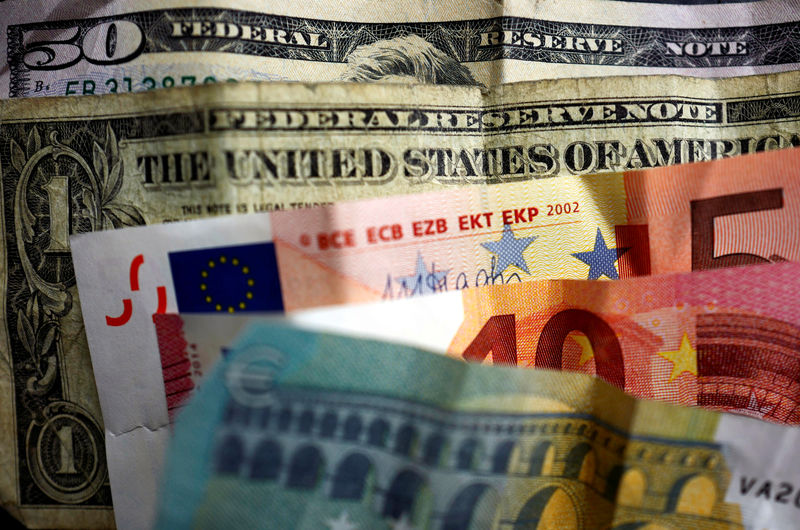Investing.com – The US dollar gained marginally Friday, with traders expressing a degree of caution ahead of the eagerly-anticipated monthly jobs report, while the euro continued to show weakness.
At 05:00 ET (10:00 GMT), the Dollar Index, which tracks the greenback against a basket of six other currencies, traded 0.1% higher to 105.827, near three-week lows after falling 0.6% overnight.
Payrolls could drive dollar direction
Dollar bulls have been partially restrained this week after private payrolls and weekly jobless claims pointed to a weakening labor market, suggesting the Federal Reserve has scope to cut interest rates further.
However, Fed Chair Jerome Powell, in a speech earlier this week, indicated that the US economy is stronger now than the central bank had expected in September when it began reducing interest rates.
The market is still expecting a rate cut in December, but the official jobs report, due later in the session, could move the dial.
Forecasts are centred on a rise of around 200,000 to nonfarm payrolls jobs in November, rebounding from October’s meager hurricane-impacted 12,000 gain, while the unemployment rate is seen edging up to 4.2% from 4.1%.
“The market is sitting long on the dollar after two months of a Trump-powered rally. Investors like the dollar story into 2025, but the question is whether they have to suffer a position-led shake-out first. Today represents a risk to those positions in the form of the November jobs report,” said analysts at ING, in a note.
Euro hit by weak German data
In Europe, EUR/USD dropped 0.1% to 1.0575, with the single currency hit by data showing German industrial production unexpectedly fell in October, pointing to further weakness in the eurozone’s dominant economy.
Production was down by 1.0% in October from the previous month, after a upwardly revised decline of 2.0% in September and an increase of 2.6% in August.
“This means that the industrial economy is still in a downturn,” said the German economy ministry in a statement.
The eurozone as a whole grew 0.4% on a quarterly basis in the third quarter, data showed earlier Friday, an annual gain of 0.9%.
This meager growth points to another rate cut by the European Central Bank next week, and the market is pricing in over 150 basis points of easing by the end of 2025.
At the same time, traders are having to factor in more French political turmoil after Prime Minister Michel Barnier lost a no-confidence vote earlier in the week, with President Emmanuel Macron set to install a new prime minister quickly.
The fall of the government leaves France without a clear path toward reducing its budgetary deficit, credit rating agency Standard & Poor’s said on Thursday.
“With less than four weeks until the end of the year, and even less time remaining until the Dec. 21 deadline to pass the budget, regardless of whether a new government is formed, S&P Global Ratings believes that the likelihood of an amended 2025 budget plan to be passed by year-end 2024 is low,” it said.
GBP/USD traded 0.1% higher to 1.2763, with sterling helped by data showing UK house prices rose for the fifth month in a row in November, pointing to a recovering economy.
Mortgage lender Halifax said prices rose by 1.3% during the month for the biggest increase so far this year, pushing the annual growth rate up to 4.8%, its strongest level since November 2022.
Asian currencies muted
In Asia, most currencies were subdued on Friday ahead of key US jobs data.
USD/JPY gained 0.3% to 150.57, USD/CNY rose 0.2% to 7.2709, and AUD/USD dropped 0.4% to 0.6426.
USD/KRW rose 0.5% to 1,419.96, with the pair set to rise 1.8% this week, its biggest weekly rise since early-April, after President Yoon Suk-Yeol’s failed attempt to impose martial law in the country.
USD/INR slipped marginally to 84.680 after the Reserve Bank of India kept benchmark interest rates unchanged, as expected on Friday, but cut its cash reserve ratio requirement for local banks.
The central bank also lowered its economic growth projection for the current fiscal year and raised its inflation estimate.

